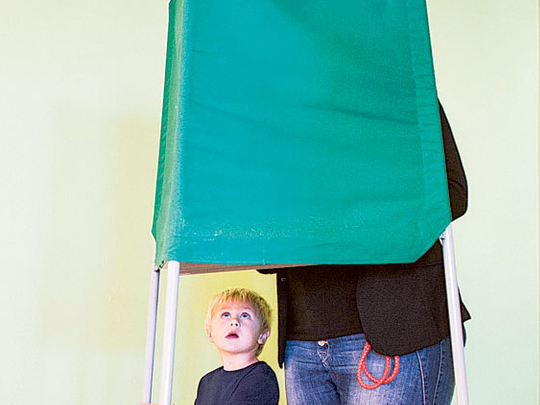
Stockholm: Swedish voters headed to the polls in general elections on Sunday, with the Social Democrats poised to reclaim power after eight years in opposition and the far right expected to make historic gains.
The anti-immigration Sweden Democrats could double their seats in parliament, as a growing proportion of the nation of 10 million express frustration with an accelerating influx of refugees.
If opinion polls prove right, Stefan Loefven, the stocky leader of the Social Democrats, looks set to become the next prime minister, although he could win by just a slim margin.
“I’ve said all along that this election is going to be incredibly tough,” the 57-year-old former welder told reporters after he cast his vote in Stockholm early on Sunday.
“That’s why we have to work hard right until the end of the campaign and not take anything for granted.”
The Social Democrats are expected to try to form a coalition government with the Greens and the former communist Left Party.
But on the eve of the election, Loefven admitted the Sweden Democrats could still throw a spanner in the works, telling Swedish news agency TT on Saturday that they could end up as “kingmakers” in the new parliament.
Sweden has been governed by a four-party conservative-liberal coalition headed by 49-year-old Fredrik Reinfeldt since 2006.
He has been widely credited with steering the country through the global financial crisis, consolidating Sweden’s position as arguably the healthiest economy in Europe.
Even so, Reinfeldt’s Moderates were predicted to garner just 22 per cent of the vote, according to a survey released on Saturday by Swedish public broadcaster SR.
Analysts say Swedes are tired of the austerity measures his government has been pushing through and are yearning to see fresh faces at the top.
“Everyone knows that the centre-right government has been quite behind the opposition, but we have narrowed the gap,” Reinfeldt told reporters after voting in an affluent suburb of the capital on Sunday.
“We made a tremendous campaign, I would say. And we have shown that we are ready for four more years.”
Polling booths opened at 0600 GMT and will close 12 hours later, determining the allocation of 349 seats in the Riksdag legislature.
An opinion poll showing an estimate of voter preferences is expected to be released at 1400 GMT.
According to the survey published on Saturday by the SR, the Social Democrats stand to secure 30.3 per cent of the vote, while the far-right Sweden Democrats would obtain 9.6 per cent, up from 5.7 per cent in the last election in 2010.
This would make the anti-immigrant party the third-largest in the parliament of a nation that has traditionally taken pride in its welcoming attitude towards foreigners.
“The Sweden Democrats is the only political party that wants to stop immigration,” said Anders Sannerstedt, a political scientist at Lund University who has studied the party closely.
“All the other political parties have a united stance, a generous immigration policy. About half the Swedes want to receive fewer refugees.”
Sweden, which has one of Europe’s most generous refugee policies, expects an influx of nearly 90,000 refugees this year — numbers not seen since the Balkan wars of the 1990s.
Voters in Stockholm interviewed early on Sunday were mostly hostile to the Sweden Democrats.
“This time we have this more or less new party on the very right wing,” said Christina Lindvall, a lawyer, adding she was most likely to vote for the Greens. “Those of us who don’t support them need to show that.”
An electoral gain for the Sweden Democrats and their dapper 35-year-old leader Jimmie Aakesson would confirm a Europe-wide trend of soaring popularity for populist right-wing parties.
The eurosceptic Alternative for Germany, which has flirted with populist positions on immigration and law and order, was expected to make big gains in elections on Sunday in the eastern states of Thuringia and Brandenburg.












